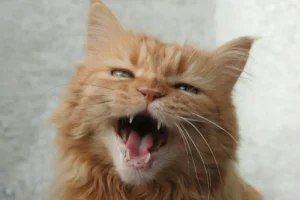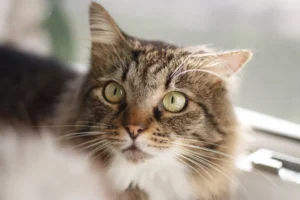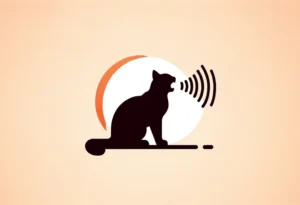Have you ever been woken up by your cat’s meowing in the early hours of the morning, wondering why they do this? Cats are known for their mysterious behaviors, and their early morning meows can be both endearing and frustrating. But why do they feel the need to vocalize at such inconvenient times?
Cats meow early in the morning as a way to communicate with their owners. This behavior can be influenced by various factors, such as hunger, playfulness, or simply seeking attention. Understanding the reasons behind this behavior can help cat owners better address their pets’ needs and establish a harmonious relationship with their feline companions.
Hunger Pangs:
Do you wake up to your cat’s early morning meows, demanding breakfast like a royal feast? Well, your feline friend might just be experiencing hunger pangs. Cats are natural hunters, and their wild ancestors would typically hunt at dawn. So, when Mittens is meowing at the crack of dawn, it’s likely because they’re ready for their first meal of the day.
To address this issue, try feeding your cat later in the evening before bedtime. This can help stretch out the gap between their last meal and breakfast time, reducing the urgency of their morning hunger calls. Additionally, consider investing in an automatic feeder to dispense kibble at the desired time, ensuring your cat’s breakfast is served promptly without disturbing your beauty sleep.
Remember, a well-fed cat is a happy cat, and setting a consistent feeding schedule can help curb those early morning wake-up calls.
Seeking Attention:
Have you ever wondered why your cat turns into an opera singer at dawn, serenading you with their meows for attention? Well, they might just be seeking attention from their favorite human – you! Cats are social creatures and thrive on interaction with their owners. When they meow early in the morning, it could be their way of saying, “Hey, wake up and pay attention to me!”
To address this behavior, try spending quality time with your cat before bedtime to fulfill their social needs. Engage in play sessions and cuddle time to ensure they feel loved and reassured. You can also provide interactive toys or puzzle feeders to keep them stimulated during the night, reducing the need for attention-seeking meows in the morning.
Remember, a happy and fulfilled cat is less likely to resort to early morning meowing for attention. So, show your feline friend some love and watch those dawn serenades fade away.
Territorial Behavior:
Cats are natural hunters and territorial creatures, and their early morning meowing may be a way of marking their territory within the household. By vocalizing at this time, they are asserting their presence and reminding other cats (or even humans) that this area belongs to them. If you find your cat meowing loudly in the wee hours, it could be their way of staking their claim and making sure everyone knows who’s in charge. Providing your furry friend with designated spaces or perches can help satisfy this territorial instinct and reduce the early morning meowing.
Circadian Rhythms:
Just like humans, cats have circadian rhythms that influence their behavior throughout the day, including their meowing habits. Cats are crepuscular animals, meaning they are most active during dawn and dusk. This natural body clock can explain why your feline friend is eager to start their day bright and early with a symphony of meows. To work with these rhythms and encourage more desirable behavior, try to establish a consistent routine for feeding and playtime that aligns with your cat’s natural energy peaks. Incorporating interactive toys and feeding puzzles before bedtime can help tire them out and potentially lead to a quieter morning.
Bonus Tip: Provide your cat with natural light exposure during the day. Allowing your cat access to sunlight can help regulate their internal clock and promote healthier sleep cycles, potentially reducing early morning meowing.
Remember, understanding your cat’s natural instincts and rhythms can go a long way in addressing their early morning meowing habits. By creating a positive environment that caters to their needs, you can help ensure peaceful mornings for both you and your feline companion.
Loneliness and Boredom:
Cats may meow in the early morning out of loneliness or boredom. They are naturally crepuscular animals, meaning they are most active during dawn and dusk. If your cat is meowing excessively in the morning, it could be a sign that they are feeling isolated or unstimulated. To alleviate these feelings for your furry friend, make sure to spend quality time with them in the evenings when they are most active. Engage in interactive play sessions, provide stimulating toys, and create a comfortable and cozy environment for them to relax in. Additionally, consider leaving out puzzle feeders or treats for them to enjoy during the night to keep them occupied and mentally stimulated.
Health Concerns:
Excessive meowing in the morning could also be a sign of underlying health issues. Cats are masters at masking pain or illness, so it’s crucial to monitor your cat’s behavior for any signs of distress. If your cat’s meowing behavior changes suddenly or becomes more persistent, it’s essential to consult with your veterinarian to rule out any potential health concerns. Common health issues that can cause increased vocalization in cats include dental problems, hyperthyroidism, urinary tract infections, or arthritis. By staying vigilant and proactive about your cat’s well-being, you can ensure they receive the necessary care and treatment if needed.
Additional Unique Insight:
When it comes to addressing your cat’s early morning meowing, consider implementing a regular feeding schedule. Cats are creatures of habit, and having a consistent feeding routine can help reduce anxiety and excessive vocalization. By feeding your cat at the same time each morning, you provide them with structure and security, which can help alleviate any underlying issues that may be causing their morning meows.
Training and Behavior Modification:
If your cat is giving you an early morning wake-up call with their meowing, there are steps you can take to address this behavior. One effective strategy is to provide positive reinforcement when your cat remains quiet during the early hours. This could involve giving them a treat or extra attention when they don’t meow. Over time, they will start to associate staying quiet with receiving rewards, helping to break the habit of morning meowing.
Another approach is behavior modification. Consider adjusting your cat’s feeding schedule to ensure they are not hungry in the morning, which may be a reason for their vocalization. Providing interactive toys or puzzles before bed can also help keep your cat entertained during the night, reducing the urge to meow early in the morning.
By incorporating these training and behavior modification techniques into your daily routine, you can work towards minimizing your cat’s early morning meowing and fostering a more peaceful environment for both of you.
Understanding Your Cat’s Needs:
It’s essential to remember that cats are crepuscular by nature, meaning they are most active during dawn and dusk. This behavior is influenced by their instincts as hunters, as these times of day align with when their prey is most active.
To address your cat’s early morning meowing, consider providing them with stimulating activities before bedtime to help tire them out. This could include play sessions, interactive toys, or even a puzzle feeder to keep them mentally engaged. Additionally, creating a calming environment in the evening, such as dimming lights and playing soothing music, can help signal to your cat that it’s time to wind down for the night.
Understanding and meeting your cat’s natural instincts and needs can go a long way in reducing their early morning meowing and promoting a more harmonious relationship between you and your feline friend.
Alex, a passionate animal lover, has experience in training and understanding animal behavior. As a proud pet parent to two dogs and three cats, he founded AnimalReport.net to share insights from animal experts and expand his knowledge of the animal kingdom.









